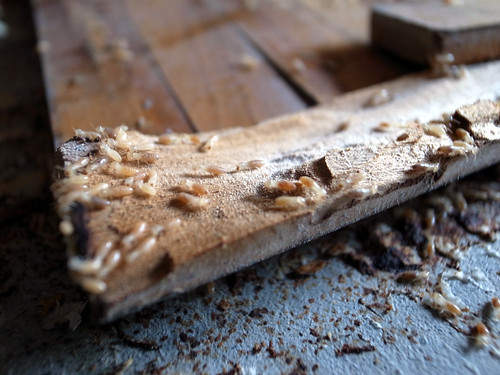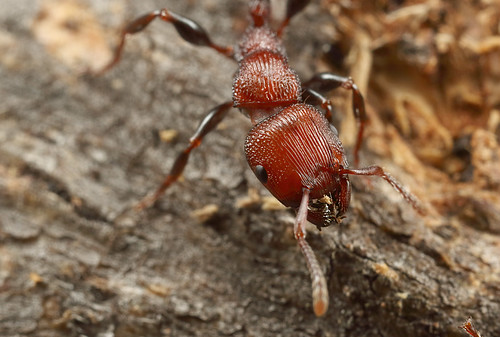
What are White Ants?
February 22, 2022
What Do Ants Do in the Winter?
February 22, 2022Ants are remarkable in their own right; by working together in a hierarchy as workers, reproductives, and the queen all complete individual tasks that are vital to an ant colony’s survival. They also perform essential environmental tasks, contributing to the fertilization of the soil in which they tunnel. Their aid in the natural process of the decomposition of organic matter such as dead insects, leaf litter, and dead animals helps keep the environment clean from debris as well.
Ants can be pests when outside but become more of a threat when they invade your home. Keeping them out can be difficult, but when armed with the right knowledge, you can be successful. Learning what attracts ants can help you when you are looking to eliminate the possibility of ants infesting your home.
What Attracts Ants?
Image via Flickr by Anosmia
Ants will travel great distances when foraging for food, water, and shelter, but how does your home become a pit stop or permanent nesting area along the way? Ants are opportunistic by nature, and if they find any of the things they need inside your home, they are sure to keep coming back or even move in when they have access to a steady supply of food and water. A few things that attract ants the most are as follows:
Food
Ants are foragers and typically form foraging trails that are scent marked so they can easily find their way between food sources and their nest. Ants aren’t picky when it comes to the type of food they eat, so just about anything you have in your home for your family to eat, ants are likely able to get nourishment from as well. Sweet foods such as syrup, jelly, candy, honey, and any other sugary foods are at the top of the list for attracting ants into your house.
Keeping your food stored in appropriate containers and cleaning up spills and food crumbs will help to deter ants from taking up permanent residence in your home.
Water
All creatures, big or small, need water to survive. Ants are susceptible to dehydration and are in constant need of a reliable supply of water to thrive. If you have moisture issues or leaky faucets and pipes in your home, you may be inadvertently attracting ants into your home. Correcting moisture issues such as these can keep ants from being drawn into your house to quench their thirst.
Potted flowers and plants
Most ants that invade your home aren’t attracted to houseplants as a source of food, but rather the moisture that is associated with the soil the plants live in. Flowers that bloom may help to draw ants as a result of the sweet aroma of the blossoms. Aphids are also attracted to indoor plants and excrete a sugary substance known as honeydew that ants highly covet. Some ants care for and protect aphids as a means of having a steady supply of honeydew.
Regular inspection of houseplants for activity from unwanted pests will help to ensure that you don’t have ants invading your home in search of aphids and the moisture that soil provides.
Nesting Areas
Ants will enter your home out of curiosity and in the search for food and water, but if they find that it provides a secluded and safe area to inhabit, they won’t hesitate to move on in. Areas that are likely to be used to build a colony are in foundation walls and behind baseboards.
Prevention of this type of invasion can be evaded by inspecting the exterior of your home in search of any possible entryway that ants could use to find their way inside. It may be impossible to block every access point, but sealing any cracks or crevices can prevent ants from intruding in your living space. A professional pest control agency can help with fortifying your home against ant infestations.
Pesticides
Yes, you read that correctly, pesticides that are applied to your lawn or garden may trigger a mass exodus and send ants directly into your home. Though pesticides can be effective at eliminating ants and other pests from your property, ants that aren’t directly impacted could seek shelter from the chemicals inside your house.
You can potentially avoid this type of situation by using non-repellent insecticides and natural remedies for eliminating ants.
Landscaping
The landscaping that is closest to your house can play a role in bringing ants into your home. Trees and shrubs that are in direct contact with the side of your house can provide access to your home. These plants will need to be adequately maintained and trimmed away from the house to deter ants from entering your home.
Protecting Your Family and Your Home
Ants can pose a threat to your family and your home. Taking measures to protect your home from an ant infestation will help you to avoid sickness, disease, bites and stings, and the property damage that ants can cause. Being proactive and working to ant-proof your home is your first line of defense.
Keeping your home clean clear of clutter where ants can create nests will discourage them from wasting time in your house. If they can’t find what they need, there will be no reason for them to stay. Using ant bait is a great way to keep ants at bay and out of your private space. Ant bait can be matched to the type of ant depending on the types of foods that specific ant species are attracted to.
Slow acting ant baits will eliminate any unwanted ants and their colonies as the workers carry it back to their nest and supply it to all the other ants, including the young and the queen. This type of ant control is a simple DIY solution for dealing with ants in and around your home. Knowledge is key to keeping your family and home safe from the threat of an ant invasion. You can learn more at Ants.com.






